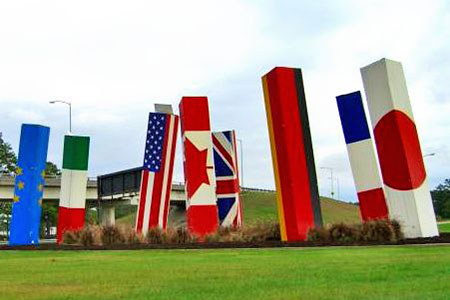|
from
GlobalResearch Website
The self-appointed elect, those states at the G7, have decided to have a chat about matters deemed critical for them. A few interlopers are also present - Nigeria, Tunisia and Liberia, for instance.
Like any club whose rules vary
between snooty and arbitrary, there were exclusions. On this
occasion, basic arithmetic dictated that it would be a G7 summit, as
opposed to
a G8 one - Russia was excluded,
largely because, it would seem, the member states needed
something to talk about.
The G7 chat fest did take some time out to consider the environmental side of matters, suggesting that fossil fuels were being given the heave ho.
But the members had two states in their sights.
One was the superstar absentee, target of European and US morality and historical ennui: Russia.
As the G7 communiqué outlined,
The other
was Greece, target of economic
opprobrium and whipping boy of Europe's disastrous financial
policies.
As with so much in the realm of power politics, imitation is the most sincere form of flattery.
The relationship between Ukraine and Russia has been terse, vicious and rubbed by history. That tends to be patched over by the sovereignty argument, while ignoring EU and NATO complicity in undermining Kiev.
The communiqué itself makes it clear where Ukraine should orient itself.
Independence is simply the prop for the big EU-US-Russia show.
The idea that Russian "aggression" is
somehow monolithic, innate and clearly demarcated is as naïve as it
is dangerous. But the various parties have come to the conclusion
that the
peace plan outlined at Minsk in
February is the one to aim for.
The Chancellor attempted putting a brave face on it all.
The G7 front was,
Much of this seems disproportionate and more than just thinly veiled hypocrisy.
Russia's suspension from the G8 for its
backing of eastern Ukrainian separatists, and the Crimean
annexation, suggest a clear context for targeting a country for
violating the sovereignty of others. But when one considers the
other members of the same family of summitry, including France,
Britain and the UK, the list of violators of sovereignty is
extensive.
French, UK and US money floats into bank
accounts of various militant forces who have marshaled themselves
against the Islamic State. Labels such as "moderate" are used in
recognizing which group will get funding in the fight, either
against the Assad regime itself, or the even less
savory groups connected with ISIS. Sovereignty has little to do with
any of this.
This did not seem to bother Merkel, who had herself been the subject of NSA surveillance and phone hacking. Let bygones be bygones.
As she declared at Schloss Elmau,
Germany and the US were "inseparable allies". [3]
The summit provided the stage for the European commission president Jean-Claude Juncker to vent his spleen.
There were other gems fashioned.
Terrorism, which is the background always depicted these days as a grandly dangerous foreground, featured.
Nigeria's President Muhammadu Buhari
came with his own "wish list" hoping for a firm stance against Boko
Haram.
Forms of regulation are encouraged in the name of combating "radicalization", noting the reach of the Internet and the scope of social media sites. Fear substitutes necessary evidence. Illusion takes the place of policy.
Perfect yet predictable outcomes of such
summits...
|


